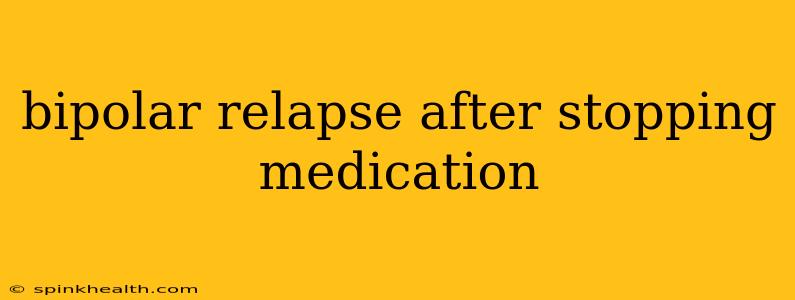The quiet hum of stability, a melody carefully orchestrated with medication, can abruptly shatter. For those living with bipolar disorder, the decision to stop medication, even with the best intentions, can tragically lead to a relapse. This isn’t a judgment, but a stark reality grounded in the complex nature of this mental health condition. Let's delve into the reasons behind this, exploring the warning signs, and understanding the path towards recovery.
Why Do People Stop Taking Bipolar Medication?
This isn't always a reckless choice. Sometimes, the side effects of medication become unbearable—weight gain, drowsiness, or even more serious complications. Other times, a person might feel "better" and believe they no longer need the medication. This sense of being “cured” is a dangerous misconception, often fueled by a desire for normalcy and freedom from the perceived burden of treatment. Financial constraints, stigma surrounding mental illness, or a lack of access to adequate healthcare can also play a significant role in medication discontinuation. The reasons are multifaceted and deeply personal.
What are the Signs of a Bipolar Relapse After Stopping Medication?
Recognizing the warning signs is crucial for early intervention. A relapse can manifest in several ways, depending on the individual and the type of bipolar disorder they experience. These warning signs can be subtle at first, escalating to more severe symptoms if left unaddressed.
H2: What are the early warning signs of a bipolar relapse?
Early warning signs can include subtle shifts in mood, sleep patterns, energy levels, and concentration. You might notice increased irritability, anxiety, or difficulty focusing. Sleep disturbances, either insomnia or excessive sleeping, are common. Changes in appetite, either increased or decreased, are also potential indicators. These subtle changes are often overlooked until they become more pronounced.
H2: What are the signs of a manic episode after stopping medication?
A manic episode, characterized by an abnormally elevated mood, can include increased energy, racing thoughts, impulsive behavior, risky decision-making, and grandiose ideas. Sleep needs decrease dramatically; individuals may feel invincible and experience an inflated sense of self-importance. This can manifest in reckless spending, hypersexuality, or even legal trouble.
H2: What are the signs of a depressive episode after stopping medication?
Conversely, a depressive episode is marked by profound sadness, loss of interest in activities once enjoyed, feelings of worthlessness or guilt, fatigue, and changes in appetite or sleep patterns. Thoughts of death or suicide can become increasingly prevalent. This profound sadness can be debilitating, impacting daily functioning and social interactions.
How Can I Prevent a Relapse After Stopping Bipolar Medication?
Stopping medication should never be a unilateral decision. It should always be a collaborative process between the individual, their psychiatrist, and potentially their therapist. A gradual tapering-off process, carefully monitored by a healthcare professional, is crucial to minimize the risk of relapse. This allows the body to adjust to the absence of the medication, reducing the likelihood of severe symptoms.
H2: Is it safe to stop taking bipolar medication?
No, it is generally not safe to abruptly stop taking bipolar medication without consulting a healthcare professional. This can trigger a relapse and worsen symptoms. A careful tapering-off process under medical supervision is essential.
H2: What should I do if I experience a relapse after stopping medication?
If you experience a relapse, seek professional help immediately. Contact your psychiatrist, therapist, or a crisis hotline. This is not a sign of weakness but a crucial step toward managing your condition effectively. Hospitalization may be necessary in severe cases to ensure safety and stability.
H2: What long-term strategies can help prevent future relapses?
Long-term strategies include maintaining regular contact with your healthcare provider, adhering to a prescribed medication regimen, practicing self-care (including healthy eating, exercise, and stress management techniques), and engaging in therapy to develop coping mechanisms. Building a strong support system of friends, family, or support groups is also essential.
The journey with bipolar disorder is a marathon, not a sprint. Relapse is a possibility, but it's not a life sentence. With careful planning, consistent monitoring, and a strong support system, you can navigate the complexities of this condition and live a fulfilling life. Remember, seeking help is a sign of strength, not weakness. Your mental health is paramount, and prioritizing it is a testament to your self-care and resilience.

